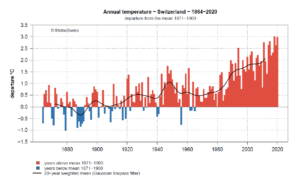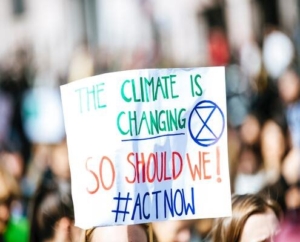Key Policies and Legislation for GHG Emissions Reduction in Switzerland
Federico Piccaluga*
Michele Dolcini **
Lugano 01.3.2023
- Introduction: The Swiss Attitude Towards Climate Change
The scientific evidence arising from the IPCC’s latest reports (2018, 2022) shows that the increase in global temperatures has already exceeded one degree Celsius (1°C). In Switzerland the rise has been even greater, according to IEA (2022), showing that the average temperature is rising two to three times faster than the global average, with 2ºC between 1864 and 2016. Considering some reference years, such as in 2015, 2018, and 2018 the temperature was even more than 2.5° Celsius warmer than in the pre-industrial period of 1871 to 1900. This century, as shown in Figure 2, includes nine of the ten warmest years since the beginning of temperature measurement.

Figure 1: Deviation in the average annual temperature in Switzerland. Source: MeteoSwiss (2022)
Taking into account the scientific evidence, the climate action that has spread globally has seen Switzerland as a central partner, largely aligned with the European countries. Over the years, the Swiss Confederation has implemented several climate laws and policies to reduce greenhouse gas emissions (GHG) and mitigate the impacts of climate change. As a result of a European area survey to assess the population’s attitude toward climate change, conducted by the University of London (“European Attitudes to climate change and energy”), Swiss citizens are among the most aware of the occurring climate change patterns, with 96.4% of the population answering that climate is probably or definitely changing (p = 75th percentile). In terms of awareness of the anthropogenic nature of the phenomenon, 94,4% answered “yes” to the question “is the climate at least partly (or fully) caused by human activity?” (p=90th). From the study presented, the population is aware of the critical issues and challenges. As a response to population expectations, policymakers have been active for several years in promoting a set of measures and policies to contrast climate change. However, aligning policies with expectations is not always a linear process. The CO2 Act referendum rejection in June 2021 by Swiss voters (“Federal Act on the Reduction of Greenhouse Gas Emissions”) has posed a new challenge for legislators, who have been forced to formulate a new proposal. The new amendment must respect the commitments made by the Confederation through the ratification of the Paris Agreement, but at the same time ensure the support of the population.
- The Swiss Actions in the Fight Against Climate Change
The Confederation summarized its goals and ambitions concerning climate change in a policy document drawn up in 2021, the so-called “Switzerland Long-Term Climate Strategy”. Based on the scientific evidence presented in the aforementioned IPCC reports, The Federal Council, with this strategy, has designed how to cut greenhouse gas emissions to target net zero GHG emissions by 2050.
In line with its long-term ambition, outlined in the climate strategy, Switzerland has implemented various laws and policies to address climate change and reduce greenhouse gas emissions. The Swiss climate strategy relies on three core measures that address climate change at different levels:
- CO2 Act: Switzerland’s CO2 Act is the main policy tool used to reduce greenhouse gas emissions. It sets targets for reducing emissions and establishes a carbon pricing system to incentivize emissions reductions. The Act is currently under revision to strengthen emissions reduction targets and introduce new measures after the voters rejected the former attempt to revise it.
- Energy Strategy 2050: Switzerland’s Energy Strategy 2050 aims to increase the share of renewable energy in the country’s energy mix and reduce energy consumption. It includes policies such as feed-in tariffs for renewable energy producers, energy efficiency standards for buildings and appliances, and subsidies for energy-saving measures.
- The Emission Trading System (ETS): Switzerland has implemented an ETS to reduce emissions from large industrial emitters. The system works by setting a cap on emissions and allowing companies to trade emissions permits. The ETS is linked to the European Union’s ETS, which enables Swiss companies to trade permits with EU companies.
In addition to the provisions presented, after the referendum rejection of the CO2 Act revision proposed by the government, a new proposal has been launched. The objective of the new revision proposal is to maintain the Swiss strategy in line with the Paris commitments, as formulated in the first alternative presented and rejected by the citizens. The complexity lies in the funding, consequently, after the public consultation phase, the new proposal defines the funding channels. The draft legislation avoids the contested surcharges on airplane tickets and car fuel that made the first revision collapse, focusing instead on around 4.1 billion Swiss francs ($4.3 billion) in public investments destined for climate action.
- Climate Reporting Obligations for Companies
One of the most recent actions of the Swiss strategy to deal with climate change is the Ordinance on Climate Disclosure for large companies introduced in November 2022 by the Federal Council. The act refers to a set of regulations that require certain companies to disclose information about climate-related risks and opportunities. The legislation addresses the current lack of clear and comparable climate-related disclosure. The non-financial reporting obligations are modeled after the EU Directive on Non-Financial Reporting (Directive 2014/95/EU), aligning obligations for corporations among the whole economic area. The scope of application of the new ordinance involves publicly traded companies, with at least 500 employees and exceeding either CHF20 million in the balance sheet or CHF40 million of turnover; b) regulated entities supervised by the Swiss Financial Market Supervisory Authority FINMA (eg. insurance companies and banks).
According to the Ordinance, climate disclosure is based on the “Task Force on Climate-related Financial Disclosure”. The publication is required to be developed in four areas: governance, strategy, risk management, and key performance indicators and targets. Focusing on climate commitments, according to the ordinance and the TCFD scheme, companies are expected to report information at least on the following elements:
- a) the transition plan that is comparable with the Swiss climate goals;
- b) baseline assumptions for comparison purposes;
- c) quantitative CO2 targets;
- d) disclosure of all GHG emissions.
This presumption of adherence to TCFD does not exclude other reporting methodologies or standards. In these cases, however, the company must be able to provide evidence that the same obligations are fulfilled in the alternative standard.
Conclusions
Ensuring the adoption of a coherent policy to fight against climate change, in line with the Paris Agreement, is essential for Switzerland to remain within the alliance of countries leading climate action globally. From this perspective, the mandatory disclosure of climate targets and the new proposed revision of the CO2 Act are two important cornerstones of this bond. Ensuring transparency through public disclosure and the investments dedicated to the transition will contribute to the success of the Swiss strategy.
As presented, the population appears to be fully aware of the phenomenon, but at the same time opposed the cost increase expected, due to the laws and the policies that discourage the use of fossil fuels, as demonstrated by the rejection in the referendum on the revision of the Co2 Act. Policymakers are called to understand the needs and define an approach that considers the doubts of the population. At the same time, the legislator has to set up initiatives aligned with the scientific community and with the climate neutrality target contained in the “Long-term climate strategy to 2050”.
Additional readings on the issue
- IPCC, 2022: Climate Change 2022: Impacts, Adaptation, and Vulnerability. Contribution of Working Group II to the Sixth Assessment Report of the Intergovernmental Panel on Climate Change [H.-O. Pörtner, D.C. Roberts, M. Tignor, E.S. Poloczanska, K. Mintenbeck, A. Alegría, M. Craig, S. Langsdorf, S. Löschke, V. Möller, A. Okem, B. Rama (eds.)]. Cambridge University Press. Cambridge University Press, Cambridge, UK and New York, NY, USA, 3056 pp., doi:10.1017/9781009325844.
- IPCC, 2018: Global Warming of 1.5°C. An IPCC Special Report on the impacts of global warming of 1.5°C above pre-industrial levels and related global greenhouse gas emission pathways, in the context of strengthening the global response to the threat of climate change, sustainable development, and efforts to eradicate poverty [V. Masson-Delmotte / P. Zhai,/ H.-O. Pörtner / D. Roberts / J. Skea / P.R. Shukla / A. Pirani / W. Moufouma-Okia / C. Péan / R. Pidcock / S. Connors / J.B.R. Matthews
- Ordinance on climate disclosure. Available at: https://www.newsd.admin.ch/newsd/message/attachments/74006.pdf
- European Attitudes to Climate Change and Energy. Available at: chrome-extension://efaidnbmnnnibpcajpcglclefindmkaj/https://www.europeansocialsurvey.org/docs/findings/ESS8_toplines_issue_9_climatechange.pdf
***
*Federico Piccaluga is the General Counsel of Duferco Group and a qualified lawyer with international in-house experience in energy law. He is in charge of Duferco Group Sustainability activities. In 2019, he has been appointed Non-Executive Board Member of Wesii, an Italian start-up operating worldwide, that provides cutting-edge multispectral inspection services in the energy sector. Federico is a member of the Swiss Bar Association and also actively participates in different organizations including the Association of Corporate Counsel (ACC), in which he holds the role of Country Representative for Switzerland.
**Michele Dolcini is a Ph.D. Candidate at Politecnico di Milano, and formerly a teaching assistant in the course “Energy Law and Environmental Sustainability”. He has worked at Duferco Group, as a sustainability specialist, under the legal department of the Group.



